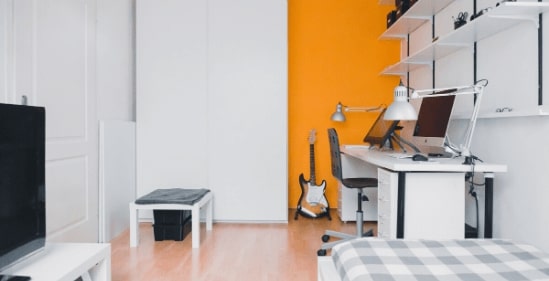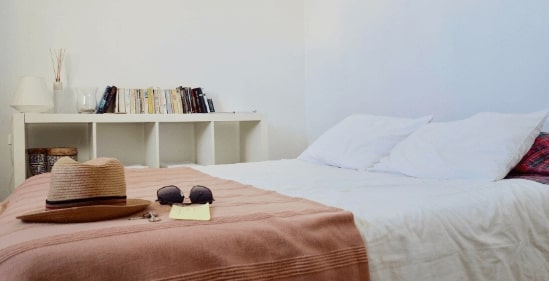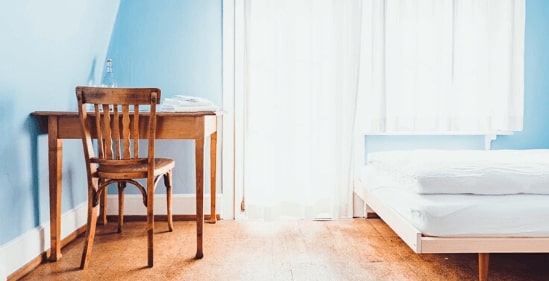The Best Student Accommodation Options in Australia: Explained

Australia is a popular destination for international students, providing a wide range of accommodation choices.
This guide assists you in discovering suitable and affordable student housing in major cities such as Sydney, Melbourne, Brisbane, Adelaide, Canberra, Perth, Hobart, and the Gold Coast. From university residences to apartments and shared houses, there are various options available.
Explore different choices based on factors like cost, amenities, location, and level of independence to find the perfect fit for your preferences.
1. Homestay

Homestay offers international students the opportunity to live with an Australian family, providing an immersive experience in Australian life, language practice, and cultural exchange. Students have their own room, receive meals, and benefit from ongoing support.
It's especially beneficial during the initial month in Australia, and schools often recommend homestay providers for booking, as it offers a genuine Aussie experience while studying abroad.
Homestay typically includes airport pickup, a furnished room in the host's home, meals, utilities, welcome orientation, and support from the homestay agent. Costs vary depending on factors such as meal options, room types, and included amenities, ranging from AUD $250 to AUD $350 per week.
Popular websites for booking homestays in Australia include Homestay Network and Homestay.
Pros of homestay accommodation include its affordability compared to other options and the comfort of living in a family environment with essential amenities.
However, there are some potential downsides, such as limitations on participation in certain cultural and social activities, and the need to adapt to the rules and customs of the host family, including dietary preferences.
2. Residential Colleges

Living in a residential college near campus is an attractive option for students, offering various amenities and services designed to enhance the academic and social experience.
Residential college accommodation typically includes meals, cleaning services, furnished rooms, and access to academic and social resources.
While it may be more expensive than halls of residence, many international students find the extra benefits worthwhile, appreciating the convenience and accessibility it provides in Australia.
At a residential college, students can expect:
-
All meals provided
-
Weekly room cleaning
-
Fully-furnished bedrooms
-
Easy access to library facilities
-
Access to tutors and Wi-Fi services
Costs for residential college apartments vary but generally fall within AUD 200 to $750 per week, including utilities.
Popular websites for booking residential college accommodation in Australia include Flatmates, Gumtree, Airbnb (select "rent" or "share" options), and Domain (select "rent" or "share" options).
Pros of residential college living include its convenience and proximity to campus, providing students with an independent living environment while still being connected to college resources.
However, there are some potential drawbacks. Students may miss out on the sense of community and belonging that comes with on-campus living, and they must manage and cover costs for additional amenities such as tutoring, internet access, and meals.
3. Managed Student Apartments

Managed tudent Apartments are tailored to accommodate 100 to 400 students, providing single or twin rooms with shared bathrooms and kitchens, sometimes housing 4 or 5 students per room. They are easily accessible and often chosen by international students in Australia.
These accommodations, constructed by private developers near universities, offer furnished rooms and shared facilities like bathrooms and kitchens.
They may provide catering or self-catering options and come equipped with high-quality amenities such as television rooms, game rooms, and gyms.
Managed student accommodations offer:
-
All utilities, including internet
-
Furnished bedrooms with essential furniture
-
24-hour security and on-site staff support
-
Opportunities for academic and social engagement
-
Communal laundry facilities
-
Well-equipped kitchens and bathrooms
-
Air conditioning, heating, and study areas
-
Recreation areas featuring cinema rooms, gyms, and BBQ facilities
Costs for managed student apartments vary but generally range from AUD 200 to AUD 500 per week, covering utilities like power, gas, water, and internet.
Popular websites for booking managed student apartments in Australia include Semester in Australia, Campus Living Villages, UniLodge, and Urbanest.
Pros of managed student accommodations include reduced living costs due to shared expenses and the opportunity to build strong friendships.
However, there are potential downsides. Shared living may lead to a lack of privacy, especially in shared spaces like kitchens and bathrooms. Additionally, conflicts with housemates over habits or belongings can create challenges that require management.
4. Private Rental

Private rentals allow international students to fully immerse themselves in Australian culture. Whether living with friends or alone, this option provides flexibility and cost-effectiveness compared to other student housing choices.
While tenants may need to furnish their own apartments and handle rental agreements, including advance rent and security bond payments, private rentals offer higher independence and comfort in managing accommodation arrangements.
Costs for rental apartments vary but typically range from AUD $100 to AUD $500 per week, excluding food and utilities.
Popular websites for booking private rentals in Australia include Flatmates, Gumtree, Airbnb, Domain, Iglu, and Uni Lodgers.
Pros of private rentals include the chance to experience Australian culture firsthand, greater independence in choosing locations and facilities, and sharing expenses with roommates to save money.
However, there are potential downsides. Dealing with landlords and property agents can be challenging, and conflicts with housemates over lifestyle differences may arise. Additionally, living independently can be costly, requiring tenants to cover all expenses, such as bills and food.
5. Halls of Residence

University-affiliated student housing is available on or near campus and offers single bedrooms with shared facilities like kitchens and bathrooms. Fees typically cover utilities and often include internet access.
Costs range from AUD $320 to $1,000 per month, with most major Australian universities providing these options primarily for international students.
Benefits include home-like amenities, proximity to campus, and opportunities for socialisation. However, students must adhere to institution rules, and additional expenses for services like cleaning may apply.
Overall, university housing provides convenience and community but may not suit those seeking greater privacy.
6. Boarding Schools

Numerous private secondary schools in Australia offer comprehensive boarding options for international students.
Boarding schools typically provide meals, laundry, and cleaning services, with fees covering additional academic tutoring and social activities.
Students can choose between shared or private rooms, promoting a supportive family atmosphere.
Costs range from AUD $11,000 to $22,000 per year, encompassing standard services like cleaning, laundry, and meals, as well as tutoring and social activities.
Pros include opportunities for social connections and access to various services, while cons include shared facilities and high costs compared to other accommodation options.
7. Hostel Accommodation

Hostels serve as a popular short-term accommodation option for students relocating overseas or interstate for studies.
There are two types of hostels to choose from:
-
Backpacker Hostels: Known for their relaxed and vibrant atmosphere, backpacker hostels offer various amenities, from basic to high service standards. Students have furnished bedrooms and access to shared kitchens, bathrooms, and recreation areas. Costs range from AUD $90 to AUD $150 per week.
-
Classic Hostels: These hostels provide a higher service standard and offer furnished bedrooms and shared amenities. Students must cook for themselves but enjoy access to communal facilities. Costs are similar to backpacker hostels.
Pros of hostel living include proximity to campus and opportunities for social interaction, while cons include shared facilities and additional expenses for food.
Popular websites for booking hostels in Australia include HostelBookers and YHA Australia.

Arranging temporary accommodation for at least 3 to 4 weeks before arriving in Australia is crucial for a smooth transition.
Temporary accommodation options to consider include:
-
Guesthouses
-
Hostels
-
Temporary housing offered by the institution
-
Low-cost hostels
Costs typically range from AUD 90 to 150 per week. It's important to personally inspect any potential permanent accommodation before securing it.
A popular website for booking temporary accommodation in Australia is Wotif.
Pros of temporary accommodation include the flexibility of short-term leases and the convenience of furnished properties. However, temporary rentals may be more expensive than long-term options, and the landlord can end the lease abruptly, leading to uncertainty and stress.
9. Free Accommodation - Au Pair

Becoming an au pair (nanny) is an excellent option for those with childcare experience, as many families in Australia seek childcare services and offer food and accommodation in return.
As an au pair, you live and work with a host family, caring for the house and children in exchange for a monthly stipend, accommodation, and meals.
Pros of being an au pair include free accommodation, regular meals, and the opportunity to earn while studying in Australia. It's also a valuable way to gain relevant work experience and immerse yourself in Australian culture.
However, there are challenges, such as adapting to the family's lifestyle, prioritizing their plans over your own, and managing work and free time in the same living space.
10. Move-in With Family or Someone You Already Know

Moving in with family or someone you already know in Australia is a wonderful option if trustworthy contacts, like family or relatives, offer accommodation.
Pros include enjoying the comforts of home, such as personal space and home-cooked meals, at a relatively lower cost than other accommodations. Additionally, students can access their own study space, which may be scarce in on-campus or shared housing.
However, there are cons to consider. Living with family or close friends may mean missing out on on-campus social activities and forming close friendships. Students may also have to stick to specific house rules and face privacy issues.
Additionally, commuting to and from college may be inconvenient if the accommodation is far from campus.
Before deciding, conduct thorough research to evaluate each accommodation option based on budget, priorities, location, transportation, amenities, safety, lifestyle preferences, and support services. Seeking advice from student support centres and university housing services can provide valuable insights.
How To Find The Best Student Accommodation In Australia?
Australia offers various student accommodation options, both on and off-campus. As an international student, finding suitable accommodations within your budget may require some assistance.
Here are a few helpful ways to make informed decisions:
Step 1: Consider Your Budget
With many student accommodation options available in Australia, you first need to consider your budget and then look for options that suit your budget. You can choose from on-campus colleges and off-campus options.
Make sure to research your institution's financial help options, such as bursaries and scholarships and possible government allowances like Relocation Scholarships and Rent Assistance.
Step 2: Do Precise Research
Thoroughly examine each accommodation option by consulting institution housing advisers and visiting on-campus residences.
Ensure comprehensive research both offline and online. If opting for an off-campus location, prioritise proximity to your university or institution.
Step 3: Weigh Up Advantages And Disadvantages
Once you've examined each option, assess the advantages and disadvantages of each accommodation.
For instance, while sharing a house with friends might offer friendship, it may not align with your academic needs. Similarly, on-campus accommodations may be relatively costly and potentially limit your sense of independence.
Step 4: Manage Your Applications
Make sure to handle your accommodation arrangements wisely. Submit your on-campus housing applications on time. If choosing shared housing with friends, ensure that everything, from bond payments to utility sharing, is well-organised and managed.
Australia provides various student accommodation options, so carefully consider your needs and budget when picking the right place to stay.
Tips and Considerations on How To Find Accommodation For Students in Australia:
-
Budget is the prime thing to consider when choosing student accommodation. Students can consider affordable on-campus and off-campus accommodation options and apply for government-based financial assistance like relocation scholarships and rent assistance to ease their budget.
-
Costs differ based on your selected state, city, and accommodation type. Cost of living calculators are a great tool to estimate your expenses and how they vary between states.
-
Always confirm the total accommodation cost and other expenses you may be liable to pay, such as a bond, gas, water, and utility bills.
-
Consider the distance between your accommodation from your campus and the accessibility of public transport, such as a tram, bus, or train.
-
Explore amenities, support services, and recreational centres in that area, such as shopping centres, hospitals, emergency services, etc.
-
Always perform elaborate research when searching for student accommodation. You may need to weigh the pros and cons and compare available options based on your preference criteria, visit the on-campus accommodations in person, and speak to the housing representatives to form an informed decision.
-
Whether arranging accommodations, submitting applications for on-campus accommodations, or making bond payments and sharing utilities with friends, overseas students should be dedicated, punctual, and disciplined.
Frequently Asked Questions (FAQs)
Can International Students Rent in Australia?
Yes. There are approx. 720,150 overseas students enrolled across several education sectors in Australia. Around 50% of them are private renters.
If a student rents a house, he has to pay a "bond" or security deposit and some rent in advance (to cover the first four weeks of your rental period).
Only the relevant government department should hold the bond money in each Australian state/ territory.
It is to pay for any damages that you, your house guests, or your housemates may cause to the rental property during the rental period. In case of no harm, you will receive the entire bond amount at lease termination.
Check the below website of your state/territory-level Fair Trading government agency to know more about your rights and obligations when renting in Australia.
-
New South Wales: NSW Fair Trading and Tenants Advice & Advocacy Services NSW
-
Victoria: Consumer Affairs Victoria
-
Queensland: Tenants Queensland and Residential Tenancies Authority
-
Western Australia: Department of Commerce and Tenancy WA
-
South Australia: Consumer and Business Services (CBS) and Tenants Information and Advisory Service
-
Northern Territory: Tenants' Advice Service and Consumer Affairs Northern Territory
-
Tasmania: The Tenants' Union of Tasmania and Consumer Affairs
For more details, check out our post on renting an apartment in Australia for international students here.
How Do International Students Get Accommodation in Australia?
Here is a systematic approach to help international students secure the perfect home for themselves:
-
Start your search well in advance to find the best options and avoid last-minute stress.
-
Determine your accommodation preferences to get clarity on the most suitable type of accommodation for yourself. Some considerations include location, amenities, closeness to your university/college, budget, etc.
-
Research online platforms for student accommodation to explore available options. These include Gumtree, Flatmates, 2stay, Domain, and Airbnb. If you want budget accommodation, try exploring shared accommodation listings or join roommate matching services to find compatible housemates. Check out the Homestay network and Home Stay if you want a homestay. If you wish to live in Hostels, refer to sites like Travel Australia Centre, Hostel Bookers, and Yha to book hostels in Australia. If you rent Managed Students Apartments, sites like Semester in Australia, Campus Living Villages, UniLodge, and Urbanest are worth exploring.
-
Contact your educational institution's housing office or student services department for on-campus accommodation options.
-
Join online communities, dedicated student groups on social media, forums, and other similar places to gain valuable recommendations, insights, and opportunities to find roommates or shared accommodation.
-
Attend accommodation fairs/events organised by educational institutions or housing organisations. These are the best places to catch up with landlords and real-estate dealers and explore options in person.
-
Plan a virtual tour to view potential accommodations to assess the property remotely. Nowadays, most agencies offer this service to potential tenants.
-
Evaluate different accommodation options and shortlist them based on your preference criteria.
-
Having found an appropriate option, do the necessary paperwork, read the terms and conditions carefully, sign the rental agreement, and make rental payments/required deposits to secure your accommodation.
All these steps increase your chances of finding the perfect student accommodation in Australia.
Useful Topics to Explore:
How useful was this post?
Click on a star to rate it!



